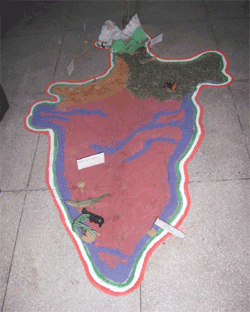We get a lot of questions from donors and friends about cultural issues in India. India is a large, richly diverse country with many different cultural groups, each with their own advantages and drawbacks. There are one billion people in India, representing every major religion, a myriad of family and social customs and nearly one thousand spoken languages. It is hard to generalize about “Indian” issues, but we have outlined a few of the challenges we have faced in our work.
 Student art project depicting India Student art project depicting India |
It is not the purpose of KHEL to judge the beliefs of others. We believe that education will give people the freedom they need to make their own choices. KHEL is a secular organization that exists in a country (and a world) often fraught with religious tension and violence. We provide help to those who are in need, regardless of their religious, ethnic or social background. We try to foster diverse communities that look beyond superficial differences. We have seen our success in that the KHEL community has always been peaceful, even during times that the rest of the country has suffered the effects of ethnic violence.
India is the most populous democracy in the world. However, like nearly every country, there is a great discrepancy between rich and poor. Although the infamous “caste system” is no longer officially recognized, there is still a great deal of work to be done on a community and individual level to overcome old prejudices, and make opportunities available to everyone.
The situation for impoverished women in India can be very challenging. To be fair, poor women in nearly every county are found in similar situations. When we began working in this community, virtually all the women were illiterate, malnourished and uneducated about basic health and hygiene. Female biology and family planning were taboo subjects. Most were unable to take part in decisions that affected their lives. Many were in abusive relationships. However, they were committed to seeing their daughters go to school, to have prospects they themselves did not.
 Traditional Folk Dance: Illuminating a path to equality Traditional Folk Dance: Illuminating a path to equality |
After just one generation of education, we have seen remarkable changes in the lives of the women we work with and in the attitude towards women in general. When young women go on to college, in addition to gaining an education, they are broadening their horizons and waiting later to consider marriage and children. Because they are educated, their families and communities respect their opinions. Most importantly, they have gained belief in their innate worth and the confidence to make their own choices.
We at KHEL believe that there are two great equalizers: education and self-esteem. This is why we provide support and schooling regardless of race, religion, ethnicity, physical handicap or gender. By treating people equally, we make the first step towards convincing them that they ARE equal. KHEL strives to give future generations the skills they need to pursue their ambitions and help build confidence that allows them the possibility of dreams.